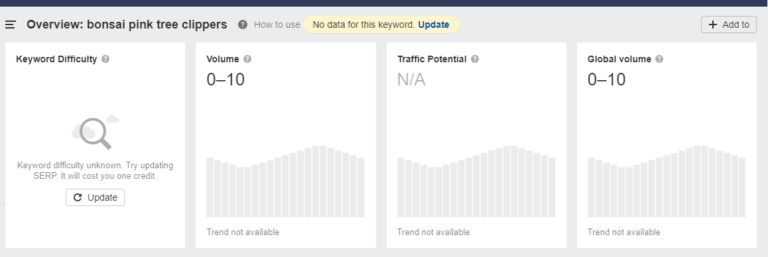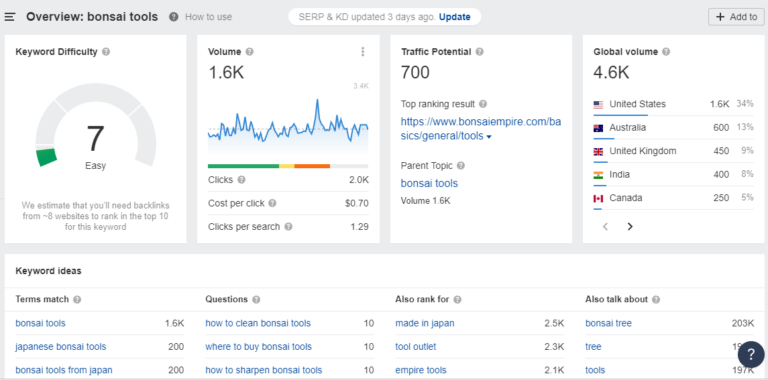We take you through a discovery process to help you decide whether a niche market is right for you.
What is a niche?
A niche is a specialized market segment for a specific product or service. It usually appeals to a particular section of the population. For example, people who cultivate Bonsai trees are considered a niche.
If you're marketing toward a niche audience, you're channeling all your efforts toward one well-defined market segment. However, some marketers believe that a niche market does not exist but is instead created through intelligent marketing techniques and identifying specific pain points of customers.
Let's take our example of Bonsai tree cultivators, they are already an existing niche market, but they might still need to learn that your product can fulfill their needs. The reason is that they have yet to discover that they have this need. This gap is where your niche marketing efforts come into play.
Your goal is to understand the entire process of cultivating a Bonsai and figuring out the various pain points, then matching your product to alleviate them.
How to spot good niches
It can be challenging to spot a niche, but there are some steps you can take that will help you. When testing an idea, look at past successes and see if you can find a central theme. Remember that what starts as a luxury often mainstreams in the future. When markets grow, they usually fragment.
You can try and see if you can semi-predict whether your market will fragment, and if so, are there any opportunities you can capitalize on? Niching works best when you create a new sub-section or category in the marketplace.
Here are five questions you need to ask yourself when looking for potential niche markets:
- Are the customers easily identifiable?
- If you can't put your ideal customer into a recognizable segment, your idea may be a no-go.
- Is the market accessible?
- You need to be able to deliver to customers efficiently.
- Is the market neglected or underserved?
- For a niche business to succeed, it ideally needs to support an underserved segment.
- Is there a sizeable potential market for this niche?
- To be profitable, your market must be large enough to make you money.
- Is the idea financially viable for customers?
- Another aspect you need to consider when exploring products for your niche market is whether the audience can afford the product.
- For example, if your target market is low-income single-parent households, but the entry price point is in the thousands of dollars, it's unlikely that you will mak

Opportunities your competitors ignore
You can capitalize on a niche market by taking advantage of opportunities your competitors will ignore. Some of the reasons your competitors will overlook a niche include the following:
- The perception that the market is too small.
- It will disrupt their current business strategy.
- It doesn't match their brand and what they stand for.
- They've tried it before and failed because it doesn't match their strengths.
- They actually need to learn how to service the niche.
What's stopping you from niching?
There are some legitimate reasons business owners avoid niching, but some are more psychological than logical.
- It requires them to focus on the niche, and often they focus on only one market, ignoring other opportunities to expand.
- Going back to the Bonsai tree example, you can have a business specializing in tools for the hobby. The problem starts when they are obsessed with only the tools and fail to see other opportunities, such as, for example, selling tool holders or boxes for the devices.
- Ignoring social proof is often deemed a setup for failure. However, even if someone has yet to try something, it doesn't mean it's a bad idea. People desire social proof of concept before they even attempt a new idea, and often that stands in the way of success.
Marketing strategies for small niche audiences
Finding and converting unique individuals who make up a niche market takes time and a decent marketing strategy. Below we cover some techniques that will help you increase sales.
Use general keywords
This tactic may sound the complete opposite of what you know about traditional ad strategies. However, you want to use more general keywords because niche-specific terms may not get you a lot of traffic.
Let's take, for example, the keyword “Bonsai pink tree clippers.” You'll see in the screenshot below that there are no searches for this keyword.

However, if you use a more general term such as “Bonsai tools,” you're more likely to get some results.

Just because zero people searched for Bonsai pink tree clippers doesn't mean there is no market for them. The problem is the keyword used. Using more general keywords can drive more traffic to your site, and Bonsai enthusiasts looking for pink clippers are probably among them.
Research your niche audience extensively
A niche market has unique demands which require a unique approach. By conducting audience research, you'll understand what your customer wants and how they want it delivered. You can do this by following the below suggestions:
- Social listening is monitoring what people say about your products or brand.
- Researching competitors and checking out the kind of audience they reach and how they engage with them.
- Discover your ideal customer by creating buyer personas for your target audience.
Doing this research allows you to understand the pain points and how to address them in your marketing messages. Google has some tools that you can leverage to help you explore niche audiences.
To better understand your niche audience, take the bigger & relevant audience segments into Audiences as observations. For example, in a search campaign targeting the keyword “bonsai tools”, we may not be able to find an audience segment for bonsai lovers only, because that's a very small niche.
Instead, we can select the in-market segment” Home & Garden”, and the affinity segment “Green Living Enthusiasts” in Audience observation. With more data accumulated in that campaign, you'll be able to identify the audience segment at a higher value based on the performance data.
You can also leverage the Audience manager in Google Ads, there are several ways to accurately find your niche audience:
- Create audience segments of visitors to your competitors' websites
- Create custom segments for people with purchase intention of your product
- Create custom segments for searchers of product-related keywords
- Upload a customer list for Google to identify similar audiences.
For the segments above, feel free to utilize them in either regular campaigns' audience observation or Pmax's audience signals.

Choose the right platform
Once you've found out who your ideal customer is, you need to know where they hang out. There are several social media platforms that you can use to market your business.
Still, it's pointless and expensive to target them all if your ideal niche market is primarily present on one or two. For example, Gen-Z likes to use Snapchat, while millennials prefer Facebook.
Build relationships
Since your niche market has a limited audience, you'll want to work on establishing relationships that drum up continuous business. It's best done by building trust and connecting with your audience.
Work on setting yourself up as an authority within the niche market. Your customers will trust you more and eventually consider your business the only place they care to deal with.
Aligning yourself with partners within the niche also allows you to offer your audience more choices in products and services, further establishing you as the go-to supplier.
Forge brand loyalty
More people trust recommendations from family and friends than they do from marketing. However, brand loyalty can help your customers become ambassadors for your business, often leading to word-of-mouth (WOM) referrals.
WOM referrals are the most potent form of marketing there is. Ultimately building a reputation with your customers by anticipating their needs and delivering a suitable solution will go a long way in helping you build a successful business in a niche market.
Another way of building solid relationships and establishing brand loyalty is by gaining favorable reviews, which can play a pivotal role in encouraging niche purposes.
You can activate the product ratings and customer reviews programs on Google Merchant Center to collect reviews and ratings for social proof. These will help you establish credibility, which strengthens brand loyalty.

Why niching improves conversion rate optimizations
Positioning your company as an expert in its field is one way of improving your credibility with customers. Here are a few other reasons why niching is excellent for improved conversion rate optimization:
- Your company can be the best by providing a subset of features that some people will love.
- It's difficult to ignore a product specifically designed to meet your needs or solve a problem you have.
- Most consumers recognize that specialization is an indicator of high performance and often quality.
- Niched products get attention and allow you to become an authority, which helps to build brand loyalty.
Niche markets: diamonds in the rough
A niche market is an excellent opportunity for businesses that can take the turmoil of building a following. Once established within the niche, you'll find that people are generally loyal for many years. To succeed within a specific ecommerce niche, optimize your marketing, decrease competition, and increase conversion rates.












